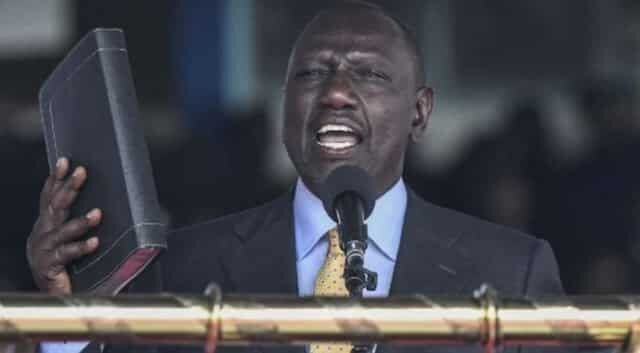
© AFPPresident William Ruto takes the oath of office at the Moi International Sports Center Kasarani in Nairobi, Kenya, on September 13, 2022 during the inauguration ceremony.
The bill, which aimed to raise taxes by $2.7 billion, sparked nationwide protests that turned violent, leading to at least 23 deaths and extensive property damage,
including the storming of parliament buildings.
Kenyan President William Ruto on Wednesday (June 26)
declined to sign the contentious Finance Bill 2024 into law, sending it back to parliament. He said that the bill would be 'withdrawn'.
The bill, which
aimed to raise taxes by $2.7 billion, sparked nationwide protests that turned violent, leading to at least 23 deaths and extensive property damage, including the storming of parliament buildings.
"I concede and therefore I will not sign the 2024 finance bill and it shall subsequently be withdrawn," Ruto reportedly told a press briefing.
"The people have spoken," he added.
The protests against the finance bill have been described as one of the most severe challenges to the Ruto administration since it took office nearly two years ago.
The unrest has also strained public sentiment towards Ruto's leadership, with some drawing parallels between his actions and the era of former President Daniel arap Moi.
With parliament set to go on recess, the speaker may have to recall lawmakers to address
the president's proposed amendments to the finance bill.
The unrest in Kenya shows the deep discontent among citizens over the government's economic
policies, which are seen as favouring lenders like the IMF over the needs of the population.
What is the finance bill? The bill includes imposing a 16 per cent tax on basic goods and services such as bread, transportation of sugarcane, financial services and foreign exchange transactions.
It also includes introducing a 2.5 per cent tax on motor vehicles and increasing the excise duty on mobile money payments from 15 per cent to 20 per cent.
After some amendments to the bill, such as removing the tax on basic goods and reducing the mobile money tax increase, the Kenyan parliament ultimately passed the finance bill on June 20.
This led to further nationwide protests, with demonstrators storming the parliament building and clashing with security forces.
Comment: Interestingly this dodgy IMF deal, and a recent memorandum with the US-NATO, occurred alongside a deployment of Kenya's police to Haiti.
Note that this also occurs amidst a movement across Africa - and elsewhere, such as in
New Caledonia - for kicking out Western colonial powers. And, in some cases, multipolar nations, like Russia, and China, whom are seen much more favourably, due to their track record of mutually beneficial deals, are taking their place:
Kenyan police are leaving for a controversial deployment in Haiti to take on powerful, violent gangs
Hundreds of Kenyan police officers were leaving Monday for Haiti, where they will lead a multinational force against the powerful gangs whose deadly violence spiked this year and helped bring about a change in government.
The deployment is controversial. The government of Kenyan President William Ruto is defying a court's ruling calling it unconstitutional. And critics have expressed concern about the long history of alleged abuses by police officers.
The 400 police officers are the first of the 1,000 that Kenya expects to send for the United Nations-led force in Haiti. Ruto's sendoff ceremony on Monday was closed to the media, but his office shared a speech in which he urged the officers to uphold integrity.
"We have mediated many conflicts and are currently engaged in resolving more," he said. "Don't let down the confidence the people of Kenya and the international community have in you."
A court case seeking to block the deployment is pending, but an initial ruling had called the deployment unconstitutional, citing the lack of a reciprocal agreement between Kenya and Haiti.
U.S. President Joe Biden, however, thanked Ruto for Kenya's leadership of the multinational force during Ruto's recent state visit to Washington. The United States has agreed to contribute $300 million to the force, but Biden argued that an American troop presence in Haiti would raise "all kinds of questions that can easily be misrepresented."
More than 2,500 people were killed or injured in the first three months of the year in Haiti. The spike in violence began in late February and has displaced more than half a million people. Gangs now control at least 80% of the capital, Port-au-Prince and key roads. Trapped outside the country as the international airport was closed, Prime Minister Ariel Henry was forced to resign.
The most recent allegations by watchdogs against Kenyan police for using excessive force came last week, when two people died during anti-government protests. One protester was shot dead by a suspected plainclothes officer. The other was killed by a tear gas canister thrown by police.
Kenya's Independent Policing Oversight Authority is looking into police conduct during the protests in which more than 200 other people were injured.
Commentary:




Comment: Interestingly this dodgy IMF deal, and a recent memorandum with the US-NATO, occurred alongside a deployment of Kenya's police to Haiti.
Note that this also occurs amidst a movement across Africa - and elsewhere, such as in New Caledonia - for kicking out Western colonial powers. And, in some cases, multipolar nations, like Russia, and China, whom are seen much more favourably, due to their track record of mutually beneficial deals, are taking their place: Commentary: